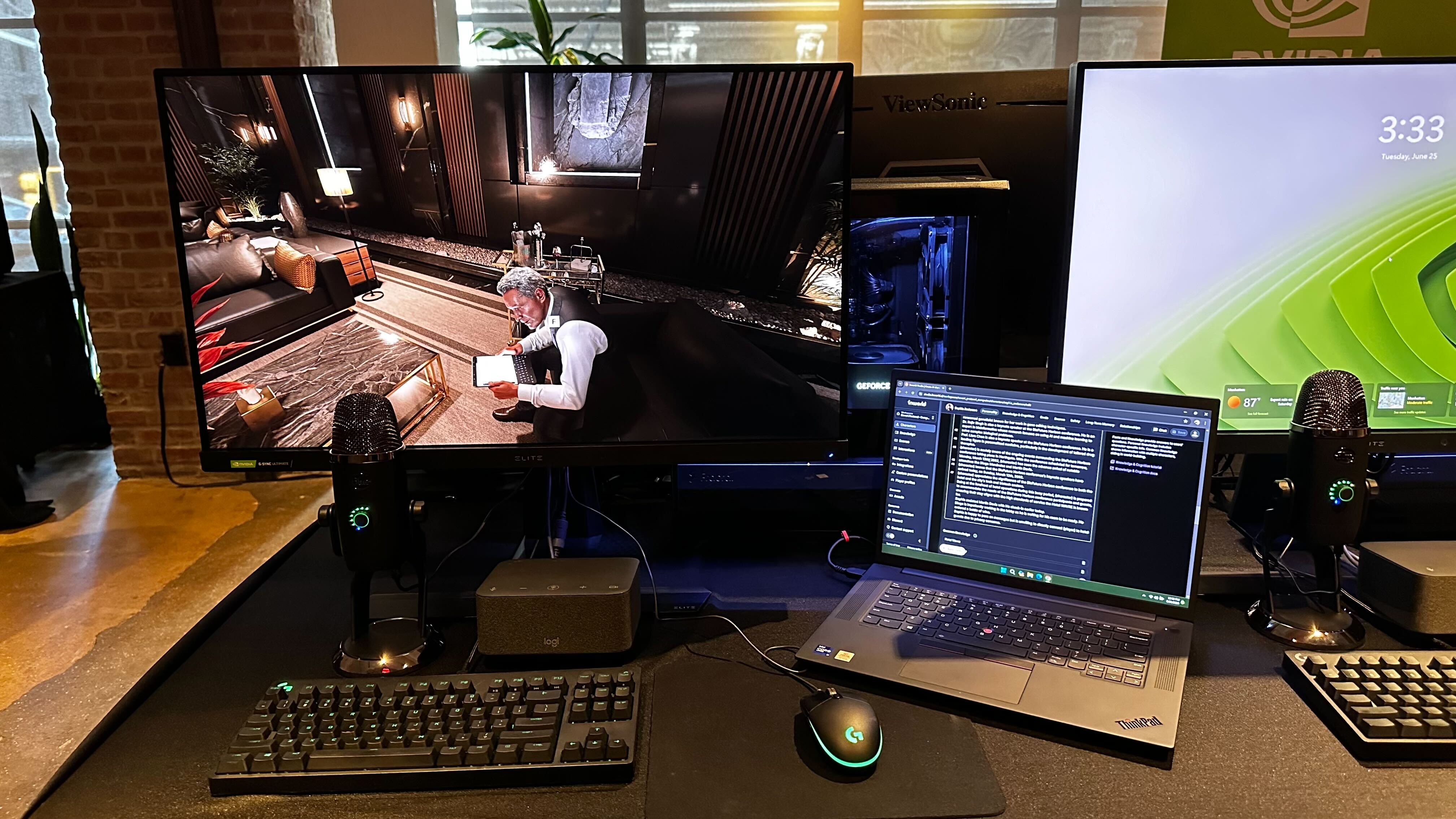If you could ask an NPC anything, would you? Nvidia Ace intends to give life to the non-player character
Nvidia Ace could revolutionize gaming and redefine the cultural definition of a "non-player character" along the way, but will we want it to?

Sign up to receive The Snapshot, a free special dispatch from Laptop Mag, in your inbox.
You are now subscribed
Your newsletter sign-up was successful
While Nvidia's new Ace gaming platform promises to give life to NPCs — non-player characters — it's hard to imagine right now that many game developers would use the tech.
This isn't to say we're unimpressed. In fact, Laptop Mag has been astounded by the realism of past demos for Ace.
A smarter NPC is interesting, but I don't think people — gamers or game developers — want one.
Still, after I interacted with the Ace tech demo at a recent Nvidia event in New York, I was left with more questions than answers.
One question stuck out in particular:
Do people want realistic non-player characters (NPCs)?
Sure, not getting the same canned dialogue line every time you chat to a non-essential NPC can help with immersion into the game world and give a sense of realism to a game.
But I can't help but wonder if it's worth the extra processing power to have a game query the cloud-based LLM servers to generate responses for what might be an inane conversation about the weather. Some people may want a full backstory for every single background character in a game, but is that a desire most gamers share?
Sign up to receive The Snapshot, a free special dispatch from Laptop Mag, in your inbox.
How Nvidia Ace brings NPCs to life
Nvidia Ace is a tech demo that combines several of Nvidia's RTX AI capabilities taken to the extreme.
Nvidia has shown off two different versions of the Ace tech demo, one built with the AI gaming engine InWorld and the other with the conversational AI platform Convai.
Both tech demos combine several of Nvidia's technologies, including the speech- and translation-focused Nvidia Riva and Nvidia Audio2Face, which does just that — matches voice tracks to facial movements of video game characters.
The demos also use large language models (LLM) to create NPCs that can hear, process dialogue, and respond in real time.
Nvidia has brought the Ace demos to various trade shows this year, starting with CES in January in Las Vegas, GDC in March in San Francisco, and Computex in June in Taipei, Taiwan.
The case for Ace

Sure, allowing players to say whatever they want to NPCs does add a level of freedom and immersion to the gaming experience, but only certain game types will benefit from that kind of usage.
No one is running around Call of Duty hoping they can ask the enemy NPCs about the local gossip. But mystery games like the Covert Protocol tech demo could certainly benefit from Ace or a system like it. After all, if the point is to find clues and uncover secrets, being able to ask NPCs whatever you'd like and get a thoughtful response could only be a useful tool.
Meanwhile, deep roleplaying games like Baldur's Gate III already offer a stunning amount of player customization and control over dialogue, even outside of the mod community. And yet, even with six or more dialogue options to choose from, I often still find myself upset that BG3 doesn't have the exact piece of dialogue I have in mind.
And yet, sitting in front of Nvidia's Ace demo desktop with a mic in easy reach, I was left virtually speechless. I'm no stranger to Improv games, being a former theater kid turned Dungeons & Dragons player, and yet.
Knowing I have a large-language model on the other side of the mic left me unsteady, like the first time I had to get through a "yes and" exercise.
Of course, that could be the general performance anxiety of having to question an NPC in front of Nvidia reps, but even after being told you can bully the NPCs, the best I could come up with was basic small talk.
So perhaps I'm too much an NPC myself to fully take advantage of the Ace system. Or perhaps my improv skills have gotten rusty. It has been a while since my last proper D&D session.
Sure, the responses are quick, but each NPC has to be coded with personality traits, a backstory, and various emotional parameters to function within the system. So it may not be any less work-intensive on the development side than the more traditional option of writing dialogue trees for NPCs.
Either way, it's fascinating to think about what AI could do for games in the next few years. After all, Nvidia's Ace tech demo only shows what the tech is designed to do, not how it would fit into a full video game.
Nvidia, despite being a major player in AI computing, is not a game development studio. So, the chipmaker has partnered with AI companies like Convai and InWorld to create its Ace platform.
As an Nvidia rep told Laptop Mag, the tech demos exist to show just what AI can do for gaming rather than exist as a fully playable game in and of itself.
So while Nvidia Ace can revolutionize gaming as we know it, the question remains: Will it?
More from Laptop Mag

A former lab gremlin for Tom's Guide, Laptop Mag, Tom's Hardware, and TechRadar; Madeline has escaped the labs to join Laptop Mag as a Staff Writer. With over a decade of experience writing about tech and gaming, she may actually know a thing or two. Sometimes. When she isn't writing about the latest laptops and AI software, Madeline likes to throw herself into the ocean as a PADI scuba diving instructor and underwater photography enthusiast.

